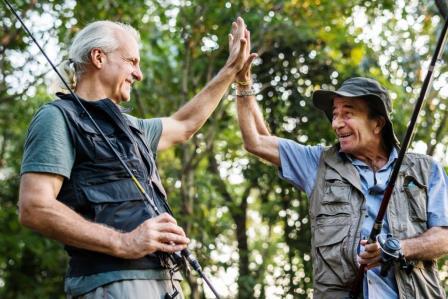‘Ageing’ and ‘getting older’
The first thing that was made clear to us was that ‘ageing’ wasn’t a very helpful word for the community. Older people with bleeding disorders thought that ‘ageing’ put them in an ‘old person’ box where they didn’t belong, and that it was negative and often discriminatory. Younger people with joint and muscle damage are often referred to as having problems of ‘early ageing’ but they also pointed out that they were still relatively young and not actually aged in years; they had muscle and joint complications which looked like the problems of ageing.
So, after some discussion with the community about what terminology might work better, we changed the name of the project from the ‘Ageing Project’ to the ‘Getting Older Project. We were careful of the language in the report and, although we did use the word ‘ageing’ on occasion, this was as a medical term.
Aspirations and goals

HFA’s vision is of ‘active, independent and fulfilling lives for people in our bleeding disorders community’, but what does this mean to older people with bleeding disorders? Understanding their aspirations and goals is essential to achieving this.
When older people with bleeding disorders were asked about their aspirations for the future, most said they wanted to maintain their quality of life, be healthy and remain independent. This involved improving their mobility, reducing stiffness and pain, and being able to participate in family life and enjoy friendships, travel, pursue their interests and to contribute in a useful way to society. Some wanted to continue working as long as they were able to, other were hoping to stop or reduce work. Some were already retired or not working. Being comfortable financially was important.
‘To remain fit, healthy and well. Travel. Support my children in caring for their future children, who may have haemophilia. Volunteer work.’
‘Maintaining my quality of life as I am noticing my health is getting more challenging year by year.’
‘To continue to be active and find a way to reduce stiffness and pain.’
‘As I get older I hope to have a comfortable life. Still having quality of life. As I said I am young at heart.’
‘The word retire doesn’t mean anything to me. I rather not retire and just keep doing things that are worthwhile, whatever that may be.’

Challenges and concerns
What could get in the way of achieving their aspirations and goals? What were they worried about?
The needs assessment covered a wide range of issues and concerns raised by community members and HTCs – you can see more in the full report. We touch on a few below.
There is a culture of stoicism and ‘getting on with it’ in this older generation. They had grown up in a time before prophylaxis, when there were treatment shortages, and as a result many lived with joint and muscle damage as a result. Many had also been exposed to hepatitis C and some also to HIV through their treatment products in the early days of the epidemics. Health professionals at the HTCs commented on their resilience and determination to overcome challenges.
‘The haemophilia community have been so resilient and stoic; they continue that one into their ageing as well. So they manage and push through a lot of things when other people need extra help.’
‘Resilience is my strength. It’s a marathon and you’ve got to have resilience.’
However, there is a limit to even the most positive and determined attitude. At a certain point, the combination of their complications with their bleeding disorder with the health conditions of ageing could be too much of a challenge to manage.
‘I always had to deal with issues all my life, but I deal with them. If I lose that ability, I feel that’s the place I am not really happy about to go to.’
Health concerns were mentioned most often by both the community and health professionals.
Many worried about losing their independence. They spoke about problems with their mobility and dexterity from the joint and muscle damage, arthritis and pain that were the result of bleeding episodes over a lifetime. This could limit their ability to work, make it difficult to travel and prevent them from being as active socially – catching up with family, friends, the foundation activities – all of which was important to their enjoyment of life.
Some talked about the trouble they were having infusing their treatment, with arthritic, shaky hands and scarred veins. Who would look after their bleeding disorder if they developed dementia and moved to a residential aged care facility? Some did not know what aged care services were available or how to access them.
Getting to the HTC for appointments was also becoming more difficult – and there were so many appointments to manage all their health conditions. As they grew older they had more health issues to deal with. This could require liaison with their HTC to manage factor cover for surgery or medical procedures like biopsies or dental work. If they had cardiovascular problems, the HTC would need to work out the best approach to anti-coagulant medications with their cardiovascular specialist. HTCs were seeing more of their older male and female patients with mild haemophilia and VWD. Bleeding disorders are rare and some talked of the difficulties they had when health professionals outside the HTC would not take their concerns about bleeding complications seriously. Nearly all had a general practitioner (GP) for their general health care, but HTCs were concerned that some were not having regular preventive health checks and could miss out on treating a serious health condition early.
Younger people with the ‘early ageing’ complications of a bleeding disorder could slip through the eligibility cracks of the National Disability Insurance Scheme and other government safety net support programs.
‘At times it’s hard. The only thing that stops me from doing things is my physical being – that being hip replacements and lately I have a heart condition. I am finding with this heart condition, it’s more doing shopping. I am finding it little bit more difficult.’
‘I can find myself getting a bit shakier now which can make intravenous injections little bit harder.’
‘It’s difficult to shave, I can’t reach my top button. Brushing teeth, cutting up pieces of food, tying up shoelaces are a problem. I buy slip-on shoes. My partner dries and dresses me.’
‘As I age I was led to believe that von Willebrands would not be such an issue. I have NOT found this so. My body says otherwise!!!!’
‘The radiology team are like, let’s do the biopsy now. Then I have to say I have a bleeding disorder, I can’t have the biopsy now… okay…then the nurse [from the HTC] calls and plans. My concern with getting older is the invisibility that you get. Older women are really invisible. Older people in general are so dismissed.’
‘I use a mobility scooter these days. It’s in the back of my car. If I lose the ability to drive, I am going to be relying on other people to take me places.’
Haemophilia Foundation Australia acknowledges the Traditional Owners and Custodians of Country throughout Australia, the land, waters and community where we walk, live, meet and work. We pay our respects to Elders past and present and extend that respect to all Aboriginal and Torres Strait Islander peoples.
Sign up for the latest news, events and our free National Haemophilia magazine